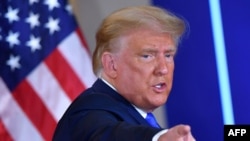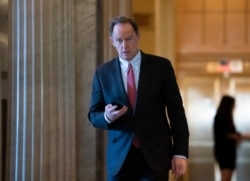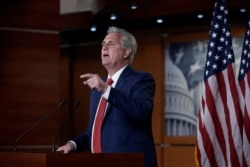On the brink of a likely electoral defeat, U.S. President Donald Trump is ratcheting up a dubious claim he's pushed for many years: rampant fraud in this week’s presidential election.
“This is a case where they’re trying to steal an election,” Trump said Thursday evening at the White House as election returns began to erode his leads in key battleground states. “They’re trying to rig an election, and we can’t let that happen.”
The groundless assertion that Tuesday’s election between Trump and former Democratic Vice President Joe Biden was corrupt and that the vote was being “stolen” drew wide condemnation from Democrats as well as many Republican politicians.
"The president's speech last night was very disturbing to me because he made very, very serious allegations without any evidence to support it," said Republican Senator Pat Toomey of Pennsylvania on "CBS This Morning."
Senator Mitt Romney of Utah, the Republicans’ 2012 presidential nominee and a vocal Trump critic, said the president was within his rights to demand recounts and call for investigations when the evidence warranted it, but that the Trump “is wrong to say the election was rigged, corrupt and stolen.”
But Trump loyalists came to the embattled president’s defense, echoing his assertions about vote-rigging as results showed Trump slipping behind Biden in Pennsylvania and Georgia.
“President Trump won this election, so everyone who is listening, do not be quiet. Do not be silent about this,” House Minority Leader Kevin McCarthy of California said on Fox News.
What is voter fraud?
The Brennan Center for Justice defines voter fraud as casting a ballot in an election despite knowing you're not eligible to vote.
Voter fraud can take many different forms. The Heritage Foundation has tracked nine different types of election fraud. The most common type in the foundation's voter fraud database is voting by people ineligible to vote, such as noncitizens and convicted felons.
Another common voter fraud type: absentee ballot fraud or obtaining an absentee ballot and filling it out without the knowledge of the actual voter.
After the 2016 election, Trump alleged that as many as 5 million illegal votes had been cast for his opponent, Democrat Hillary Clinton. But an election integrity commission he formed to investigate the matter did not turn up evidence of widespread fraud and was later disbanded.
Biden close to victory
With vote-counting still under way in several states, the winner of the election has not yet been declared. But Biden has secured 253 of the 270 electoral votes necessary for election and appeared on the verge of winning in Pennsylvania, with its 20 electoral votes, which would put him over the top.
As Trump claims fraud and his supporters take to the streets to “stop the steal,” experts warn about the potential for violent civil unrest if the election results are not quickly settled.
While Tuesday’s election — with historic levels of mail-in ballots and in-person voting amid the coronavirus pandemic — was marred by its share of routine voting problems, election officials and voting rights advocates say there is little evidence that the voting and tallying activities were accompanied by rampant fraud.
“There's no evidence to support the claim,” said Chuck Hagel, a former Republican senator from Nebraska who served as former Democratic President Barack Obama’s second defense secretary. “There's not a shred of evidence that the election is being stolen from the president. It is not true."
In Pennsylvania, where Biden is leading Trump, Secretary of State Kathy Boockvar’s office said in a statement to VOA that it has “not received any complaints except for the one incident a few weeks ago in Luzerne County, which involved a man allegedly filling out an absentee ballot for a deceased voter.”
In Georgia, where Trump’s campaign has alleged irregularities in vote counting, officials defended the process.
“We have a pretty clean and efficient process,” a Georgia state official said, speaking on condition of anonymity. “It is a transparent process, and in Georgia, we like to keep it transparent.”
The Georgia secretary of state’s office has received a “large volume” of calls about voting irregularities, but a "fair number" appear to be based on what the callers have heard on television rather than firsthand knowledge, the official said.
Arizona Secretary of State Katie Hobbs similarly rejected claims of widespread fraud.
“There is no evidence to back it up, and it is not something that we’ve experienced here,” she said in an interview with CNBC on Thursday.
Asked if any Arizonan had complained about voter fraud, Hobbs said that while her office had been inundated by emails and calls, “to my knowledge, we don’t have any specific reports of anything specific.”
In Nevada, Clark County's registrar of voters, Joe Gloria, told reporters on Thursday that the only instance of fraud he knew of involved a Trump supporter attempting to vote twice.
“My response is that we’re not aware of any improper ballots that are being processed,” Gloria said in response to a question about a Trump campaign claim that illegal ballots were being counted in Nevada.
A spokesman for North Carolina's board of elections did not respond to a question about voter fraud in the state.
Last month, Trump caused a stir when he suggested that voters in North Carolina test the security of voting in the state by voting twice. North Carolina officials subsequently warned voters that it is illegal to vote twice.
Allegations of fraud more often are made by Republicans than Democrats. The conservative Heritage Foundation has tracked 1,298 “proven instances of voter fraud,” including 1,121 cases leading to criminal convictions. The group insists the list is merely a “sampling” of voter fraud cases.
“In addition to diluting the votes of legitimate voters, fraud can have an impact in close elections, and we have many close elections in this country,” the Heritage Foundation says on its website.
But study after study has shown that voter fraud is extremely rare, and when it happens, it involves local and state elections, not presidential elections. Voting by mail is regarded as equally safe, with one study turning up 491 cases of absentee ballot fraud between 2000 and 2012
“Despite this dramatic increase in mail voting over time, fraud rates remain infinitesimally small,” according to an April 2020 report by the Brennan Center, based at New York University.
Trump's allegation about voter fraud dates to the 2016 election, when he leveled the charge as polls predicted — incorrectly, as it turned out — that he would lose the election.
But the president escalated his charges of fraud this year as states across the country announced plans to expand voting by mail during the coronavirus pandemic, eventually allowing more than 65 million people to mail in their ballots.
As in 2016, experts say Trump’s persistent claim about fraud this year has aimed to undermine voter confidence in the results in the event he loses the election.
“He started this six months ago,” Hagel said in an interview. “He started saying things like, and I quote, ‘If I lose the election, it will be because the Democrats stole it.’ He said that mail-in ballots are fraudulent. That's just not true.”
“Republican governors or Republican secretaries of state who have responsibility for the election process have said the same thing,” Hagel said.
In the days since Tuesday’s election, Trump’s campaign has gone to court in Georgia, Michigan, Nevada and Pennsylvania to challenge the vote count. In Nevada, the campaign is alleging that up to 10,000 nonresidents fraudulently voted in Tuesday’s election.
Kimberly Wehle, a professor of law at the University of Baltimore, said voter fraud is hard for Trump and his allies to prove.
“If he's going in and saying, ‘Listen, discount ballots because of fraud,’ I think he's going to have a very difficult time because the courts will want to see actual proof,” Wehle said.
Courts have been skeptical of allegations of voter fraud. In August, a Trump-appointed federal judge ordered the Trump campaign to produce evidence of fraud to back up its opposition to voting by mail.
The president’s team could have greater success seeking to invalidate ballots on the grounds that certain state laws were not followed, Wehle said.
“For example, if there's a dispute as to whether certain ballots were counted that came too late,” she said. “That's the kind of thing that, depending on the source of that law, he could win.”
Despite some legal setbacks, the Trump campaign has signaled it plans to press ahead with legal fights in undecided states crucial to winning the presidency.
Hagel, now part of the bipartisan National Council on Election Integrity, said the president's team would have to produce evidence to corroborate its claims about fraud.
"It isn't just a matter of the president says it's true," Hagel said. "You've got to have evidence, and there is no evidence."










